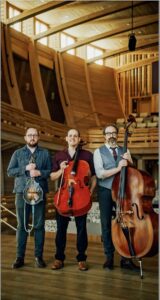Mike Block’s first instrument was the violin. But at nine, he switched to cello. “I was a short kid,” he says. Since he was small, “it was incredible to create such a low, big sound on the C string.”

The instrument was right for him, and Block has made it his career. On Thursday, April 3, he’ll bring his “bluegrass-adjacent” folk group, the Mike Block Trio, to Wellfleet Preservation Hall.
The trio has Block on cello, Joe K. Walsh on mandolin, and Zachariah Hickman on double bass. All three also provide vocals. They met in New England’s acoustic music scene and have been a trio since 2018.
“Walsh comes from a bluegrass background but has really diversified into jazz and original songwriting,” Block says. “Hickman comes primarily from a jazz background but has played a lot of bluegrass.” Together, they create mostly original music that takes from bluegrass, folk, jazz, and classical traditions.
Block, who now lives in Boston, grew up in Kansas City, Mo. He studied cello at the Cleveland Institute of Music, where he began composing and improvising in classical styles. “I wasn’t benefiting yet from learning other traditions,” he says. After getting his graduate degree in cello performance at the Juilliard School, he turned to collaborating with musicians from different backgrounds. Block teaches at the New England Conservatory of Music and runs multiple summer music programs. In 2020, he started the nonprofit Play for the Vote, which organizes performances at polling locations across the country to get out the vote and foster community.
Block has found that the cello is versatile. “Cello is simply the greatest instrument ever created,” he says. “It can be a supportive instrument, or it can be the lead.”
Block has delved into West African music in an American and African fusion band co-led by Malian balafon player Balla Kouyaté, whom Block met as a member of Yo-Yo Ma’s Silk Road Ensemble. The band’s music is complex, but the cello fits in like a final puzzle piece, alternating between percussive, rhythmic, and melodic roles.
Block also has a duo with Indian tabla player Sandeep Das in which they combine their respective backgrounds in European classical and Indian classical music. In their piece “Fight or Flight,” the cello provides a virtuosic line over the tabla drums’ fluttering beat. In another song, “Where the Soul Never Dies / Raghupati Raghava Raja Ram,” the cello adds a richness to the musicians’ vocal melodies.
In Block’s trio Biribá Union, with Christylez Bacon and Patricia Ligia, the cello is the sole melodic instrument, its voice in conversation with Ligia’s plucked electric bass and Bacon’s percussive beatboxing or rapping. “Every style is a different language with a different accent,” Block says. He’s fluent in West African rhythms, classical Indian improvisations, and contemporary hip-hop.
In all these groups, he plays the cello standing up. In a string quartet or orchestra, every player is seated, but “in nonclassical situations, I would be the only one sitting,” Block says. There would be a disconnect between him and the other musicians. To remedy this, Block created and patented the Block Strap, a cushioned, adjustable strap that attaches his cello to his chest, allowing him freedom of movement. He started using the Block Strap in 2013. “At this point,” he says, “playing standing up is what feels normal.”
At Wellfleet Preservation Hall, the Mike Block Trio will perform a mix of original songs and arrangements. Playing with Walsh and Hickman feels natural — “There’s a lot we share culturally, musically, and instinctively,” Block says. “We have such a strong footing that we can take advantage of each other’s flexibility.”
The trio released an album in 2022 called What Now? On the title track, Block opens with a jazzy cello solo. Soon the mandolin joins in, adding a syncopated rhythm, light and sharp in contrast to the smooth cello line. Hickman plucks softly on the bass. While the three musicians collaborate harmoniously, each instrument still has a chance to shine.
“It’s a tricky thing to aim for the flow state,” Block says, meaning the point at which a musician feels truly in the zone, losing track of time. “You can reach it easier if you’re not aiming for anything.” Usually, he says, “there’s a point in the show where it takes on a momentum of its own.”
In “Highland Ridge,” which Block calls a “progressive bluegrass tune,” the group shows its virtuosity. The jaunty tune is quick and athletic — the cello starts with the top line, then passes it to the mandolin while the bass thumps along.
“Dieupart’s Sarabande” was based on a piece by French harpsichordist and composer Charles Dieupart. “We took a keyboard sarabande and charted it like a jazz tune,” Block says. “It has a Baroque sensibility but a jazz level of improvisational freedom.” Here, the cello dazzles in its native language of classical music. Block’s tone is clear, his trills pure. Despite the Baroque nature of the piece, Block’s playing is more jazzy, with swoops and slides.
When a tune includes lyrics, like in “One Fine Day,” Block sings while playing. It’s a difficult feat, one that he learned “slowly and carefully,” Block says. The song is quick and merry. While all three instruments have complicated rhythmic parts, the musicians still manage to sing in harmony. “One fine day,” they sing, “I’ll have it made.”
Block writes songs for the trio with the specific talents of Walsh and Hickman in mind, he says. “Knowing what your band is capable of can be really inspiring,” he says. “When you write music, you imagine who’s going to be playing it. You trust that they’ll bring their own magic to it.”
Progressive Bluegrass
The event: Mike Block Trio in concert
The time: Thursday, April 3, 7 p.m.
The place: Wellfleet Preservation Hall, 335 Main St.
The cost: $30 plus fees at wellfleetpreservationhall.org
